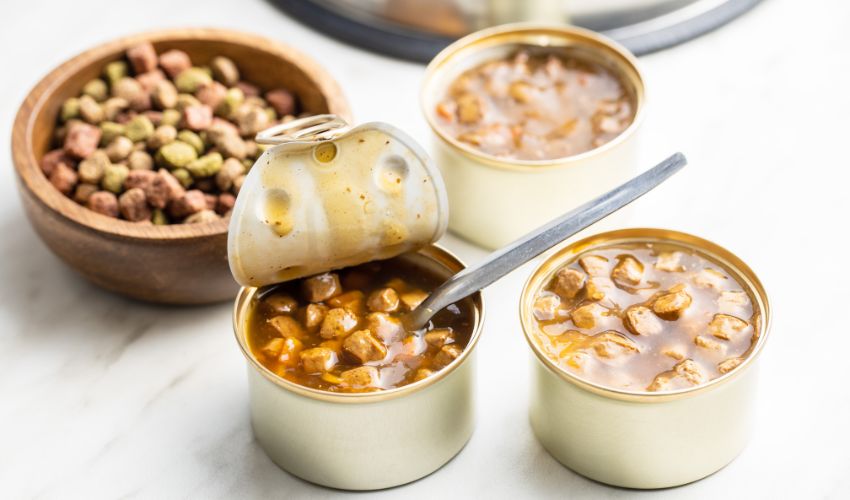Inflammatory Bowel Disease (IBD) presents a complex challenge for our beloved pets, affecting their gastrointestinal (GI) tract with various inflammatory conditions such as gastritis, enteritis, and colitis. This chronic ailment can significantly impact a pet’s quality of life, necessitating a thorough understanding of its causes, symptoms, treatment options, and prevention measures.
What is Inflammatory Bowel Disease (IBD)?
Inflammatory Bowel Disease (IBD) is characterized by chronic inflammation of the gastrointestinal tract in pets, encompassing a spectrum of disorders affecting different parts of the digestive system. Gastritis involves inflammation of the stomach lining, enteritis affects the small intestine, and colitis targets the large intestine. While the precise cause of IBD remains elusive, multiple factors contribute to its development, including genetic predisposition, immune system dysfunction, dietary sensitivities, and environmental triggers.
Recognizing Symptoms and Seeking Diagnosis
Pets with IBD may exhibit a diverse array of symptoms, ranging from chronic diarrhea and vomiting to weight loss, decreased appetite, lethargy, and abdominal discomfort. These symptoms can vary in severity and may fluctuate over time, making diagnosis challenging. Veterinarians typically conduct a comprehensive examination, including blood tests, fecal analysis, imaging studies (such as X-rays or ultrasound), and possibly gastrointestinal biopsies to confirm inflammation and rule out other potential causes of gastrointestinal distress.
Navigating Treatment Options
Managing Inflammatory Bowel Disease in pets requires a multifaceted approach aimed at reducing inflammation, alleviating symptoms, and improving overall gastrointestinal health. Treatment strategies may vary based on the severity of the condition and the individual pet’s response to therapy.
- Dietary Modifications
Dietary management plays a pivotal role in controlling IBD symptoms. Transitioning to a highly digestible, hypoallergenic diet can help reduce inflammation and gastrointestinal distress. Veterinary-prescribed diets formulated for pets with sensitive stomachs or homemade diets featuring novel protein sources and easily digestible carbohydrates are commonly recommended.
- Medication
Medications such as corticosteroids (e.g., prednisone), immunosuppressants (e.g., azathioprine), and antibiotics (e.g., metronidazole) may be prescribed to control inflammation, suppress the immune response, and manage symptoms. These medications are typically administered orally and require periodic adjustments based on the pet’s response and potential side effects.
- Nutritional Supplements
Supplements such as probiotics, prebiotics, and omega-3 fatty acids play a vital role in supporting gastrointestinal health and immune function in pets with IBD. Probiotics aid in restoring beneficial gut bacteria, while prebiotics provide essential nutrients for their growth. Omega-3 fatty acids possess anti-inflammatory properties, potentially reducing gastrointestinal inflammation.
- Stress Reduction
Stress can exacerbate IBD symptoms in pets, emphasizing the importance of minimizing stressors and maintaining a calm, predictable environment. Providing a comfortable living space with ample opportunities for rest and relaxation, along with the use of pheromone diffusers or calming supplements, can help alleviate anxiety in affected pets.
- Environmental Management
Environmental factors such as parasites, toxins, and allergens can trigger IBD flare-ups. Pet owners should prioritize keeping their pet’s living environment clean and free from potential irritants, utilizing pet-safe cleaning products, and minimizing exposure to cigarette smoke, household chemicals, and other environmental toxins.
- Alternative Therapies
Some pet owners may explore alternative therapies such as acupuncture, herbal medicine, or chiropractic care to complement conventional treatment for IBD. While these therapies may offer additional benefits in some cases, it’s essential to discuss them with your veterinarian to ensure they are safe and appropriate for your pet’s individual needs.
Prevention Tips:
Regular Veterinary Check-ups:
- Routine veterinary visits are crucial for maintaining your pet’s overall health and well-being. During these check-ups, your veterinarian can assess your pet’s condition, monitor for any changes in health status, and identify potential risk factors for Inflammatory Bowel Disease (IBD) or other gastrointestinal issues. Early detection and intervention can significantly improve treatment outcomes and prevent the progression of the disease.
Balanced Diet:
- Providing your pet with a balanced and nutritionally complete diet is essential for supporting their gastrointestinal health and reducing the risk of IBD. Choose high-quality pet foods that are formulated to meet your pet’s specific nutritional needs based on their age, breed, size, and any underlying health conditions. Avoid sudden dietary changes, as these can disrupt your pet’s digestive system and potentially trigger gastrointestinal issues. Instead, introduce new foods gradually and monitor your pet’s response to ensure they tolerate the diet well.
Hydration:
- Adequate hydration is vital for maintaining optimal gastrointestinal function and supporting overall health in pets. Ensure that your pet has access to clean, fresh water at all times, especially during hot weather or periods of increased physical activity. Proper hydration helps prevent dehydration, supports digestion, and facilitates the elimination of waste products from the body, reducing the risk of gastrointestinal issues such as constipation or diarrhea.
Parasite Prevention:
- Parasitic infections can contribute to gastrointestinal inflammation and exacerbate symptoms of IBD in pets. To minimize the risk of parasitic infections, it’s essential to keep up with regular parasite prevention measures. Use veterinarian-recommended flea, tick, and worm control products to protect your pet from common parasites that can transmit diseases and compromise their gastrointestinal health. Follow your veterinarian’s recommendations for parasite prevention protocols based on your pet’s lifestyle, risk factors, and geographic location.
Stress Management:
- Stress can significantly impact your pet’s digestive health and contribute to the development or worsening of IBD symptoms. Minimize stressors in your pet’s environment by providing a safe, comfortable, and predictable living space. Create opportunities for mental stimulation, exercise, and relaxation to help alleviate stress and promote emotional well-being. Consider incorporating enrichment activities, such as interactive toys, puzzle feeders, or supervised outdoor playtime, to keep your pet mentally engaged and physically active.
Avoidance of Toxins:
- Exposure to toxins can irritate the gastrointestinal tract and exacerbate symptoms of IBD in pets. Take proactive measures to keep your pet away from potential toxins, including household cleaners, pesticides, fertilizers, and toxic plants. Store household chemicals and hazardous substances securely out of your pet’s reach, and use pet-safe alternatives whenever possible. Be cautious when using lawn and garden products, and avoid allowing your pet to ingest or come into contact with potentially harmful substances.
By implementing these preventive measures and partnering with your veterinarian to prioritize your pet’s health and well-being, you can help reduce the risk of Inflammatory Bowel Disease and promote a happy, healthy life for your furry companion.
Inflammatory Bowel Disease poses a significant challenge for pets and their owners, necessitating a comprehensive understanding of its complexities, tailored management strategies, and proactive prevention measures. By recognizing the symptoms, seeking timely diagnosis and treatment, and implementing dietary modifications, medication, stress reduction techniques, nutritional supplements, and environmental management strategies, pet parents can help their furry companions thrive despite the challenges posed by this chronic condition. Consulting with a veterinarian is essential to develop a customized treatment plan that addresses the unique needs of each pet, ensuring optimal care and improved quality of life. With dedication, patience, and compassionate support, pets with IBD can lead fulfilling lives alongside their devoted owners.













